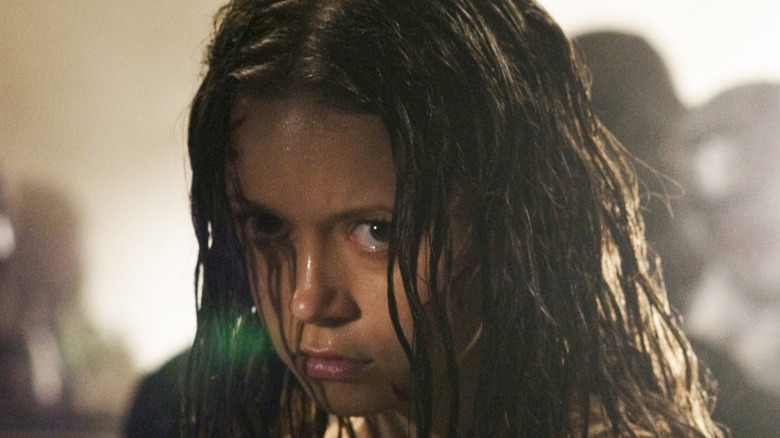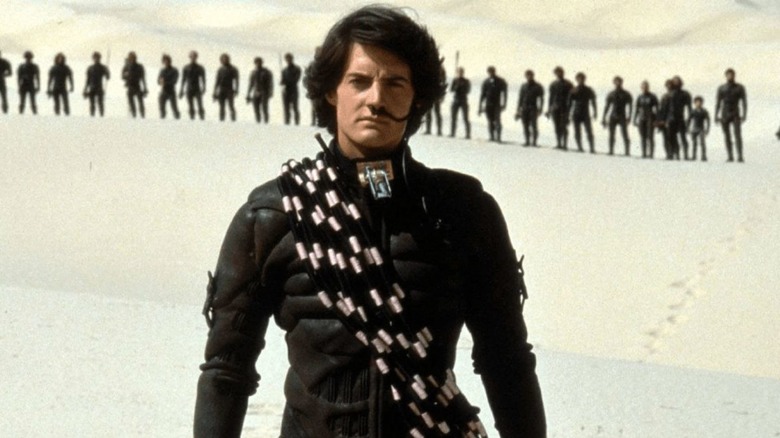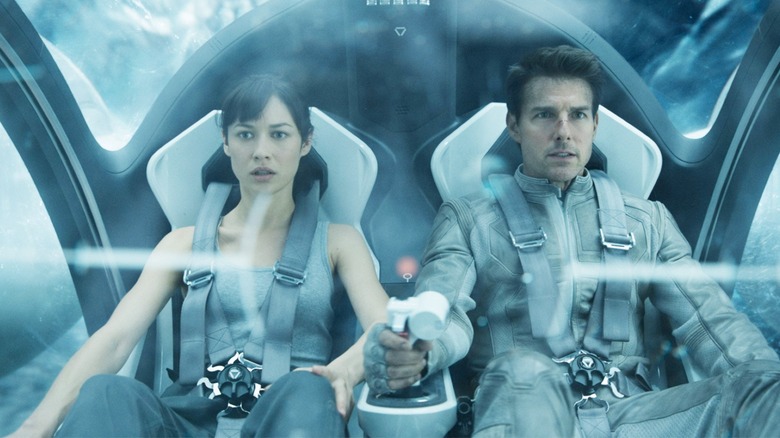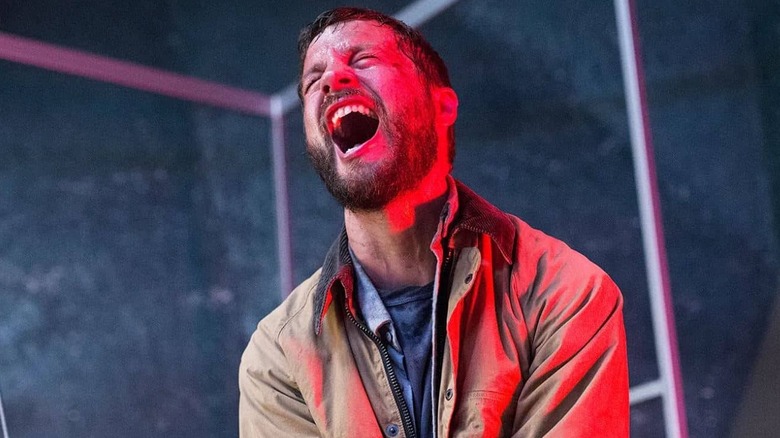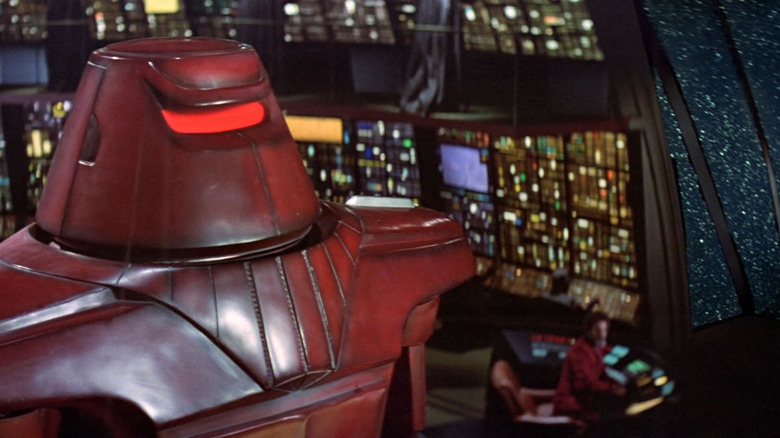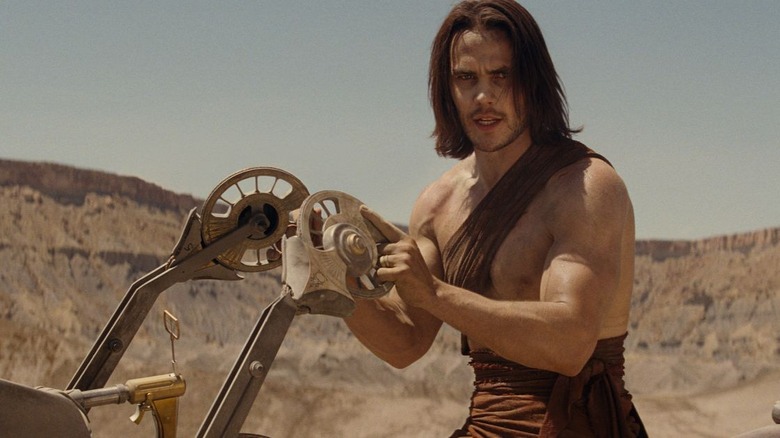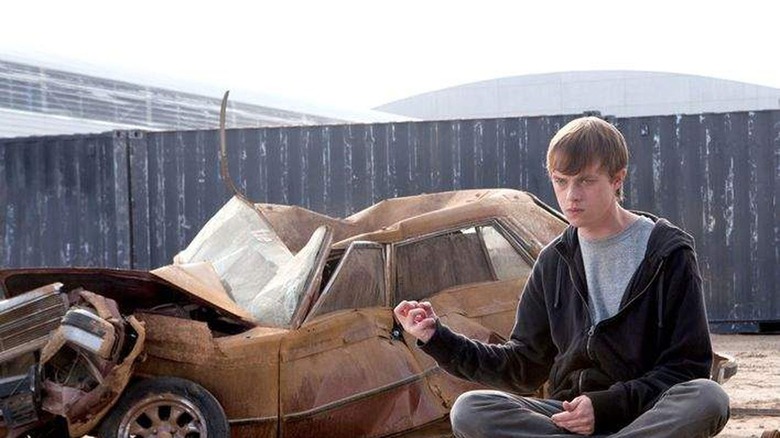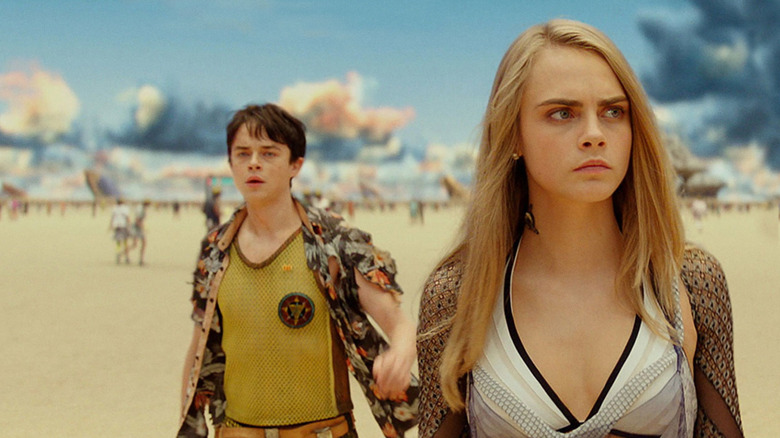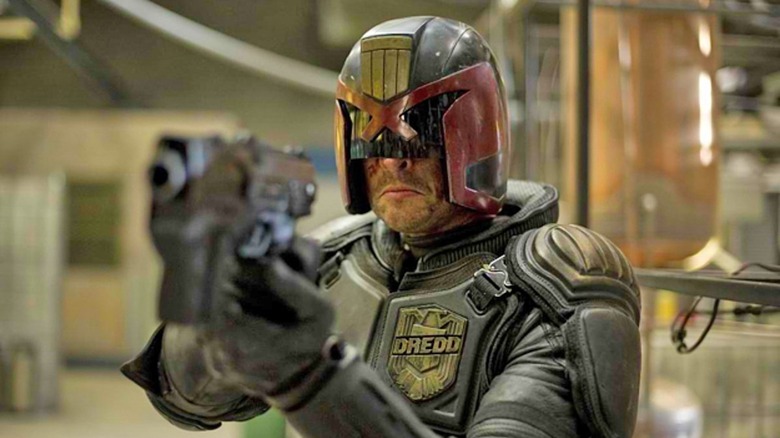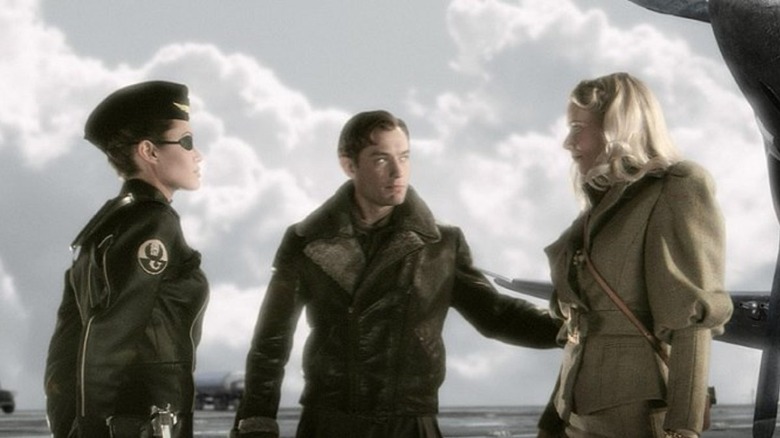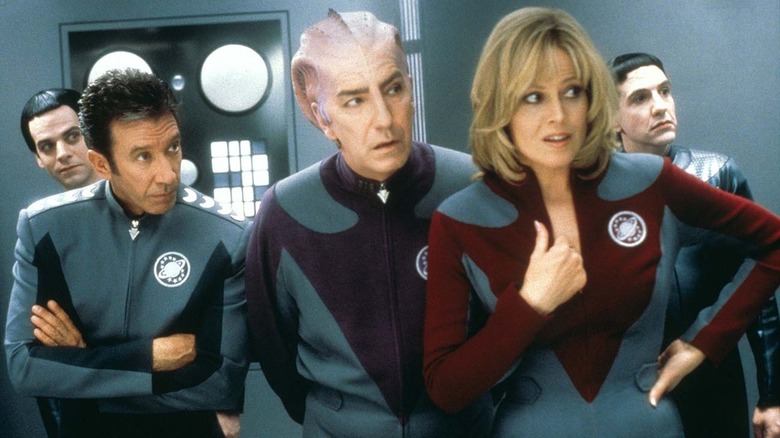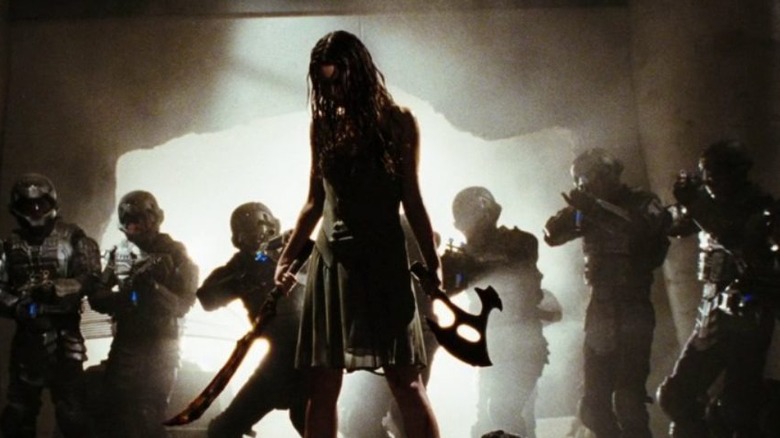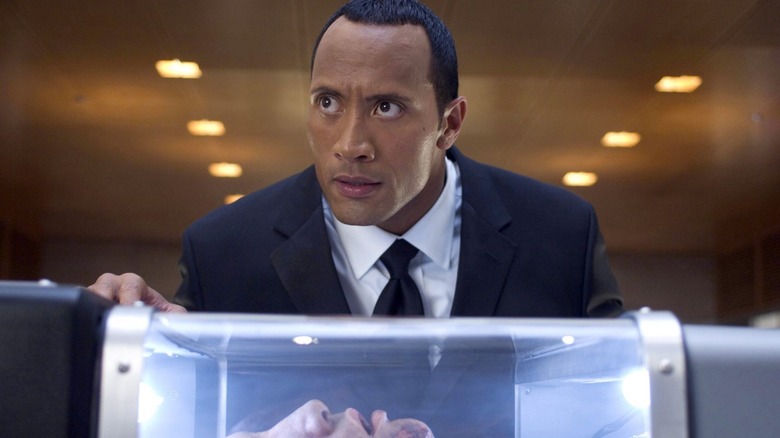12 Awesome Sci-Fi Movies That Never Got Sequels
Many of the greatest science fiction franchises of all-time have benefitted from multiple cinematic installments that help expand their mythologies. Not every sequel to "Star Wars," "Star Trek," and "Alien" is great, but few would argue that their legacies are isolated to just one film. Occasionally, a sequel is even better than the original; recent films like "Mad Max: Fury Road" and "Blade Runner 2049" surpassed expectations and became classics in their own right.
But not every sci-fi series gets that opportunity. Negative critical reaction, poor financial performance, and a lack of creative interest can stop a burgeoning franchise in its track. Not every awesome sci-fi film requires a sequel, either; classics like "2001: A Space Odyssey" or "Donnie Darko" don't leave room for expansion, and inspired disappointing follow-ups.
However, many sci-fi films have sequel potential, but never got one. Some were immediately hailed as classics. Others gained a following over time. Either way, the time has passed; these franchises will likely never happen, although the demand is certainly there if the stars happen to align.
Dune
Denis Villenueve's take on "Dune" is easily among the most anticipated films of 2021, but it won't be the first time a brilliant auteur adapted Frank Herbert's complex sci-fi novel for the screen. After cult director Alejandro Jodorowsky planned an ambitious version that fell apart (detailed in the 2014 documentary "Jodorowsky's Dune"), David Lynch experienced similar difficulties bringing the first "Dune" to life. Lynch was not given final cut, and the film failed to earn back its budget following harsh reviews — Roger Ebert claimed it was the worst movie of the year.
However, time has been much kinder, and like much of Lynch's work, "Dune" has been the subject of critical reappreciation. Lynch's meticulous world building and the movie's idiosyncratic characters were a novelty among the colorful, crowd-pleasing sci-fi epics of the early '80s, and the score from rock band Toto is brilliant. "Dune" also contained the film debut of frequent Lynch collaborator Kyle MacLachlan, who added naïveté to the role of Paul Atreides, a duke's son thrust into violent political chaos following the expansion of the evil Spacing Guild.
Lynch's plans to adapt Herbert's second Dune book, "Dune Messiah," were dropped after the movie's poor reception. A sequel could have allowed one of the greatest directors of all time to return to sci-fi blockbusters, a genre he hasn't touched since. Giving Lynch more creative control would've made a sequel rise to even greater heights, and it's a shame that it never came to fruition.
Oblivion
Tom Cruise has starred in many of the best-known science fiction films of the 21st century, including "Minority Report," "Edge of Tomorrow," "Vanilla Sky," and "War of the Worlds," but his 2013 post-apocalyptic mystery "Oblivion" is frequently forgotten. Directed by "Tron: Legacy" filmmaker Joseph Kosinski, who adapted his own graphic novel, "Oblivion" is a thoughtful, imaginative exploration of memory and loneliness that deserves more attention.
Cruise stars as Jack Harper, a technician who operates a remote base on the ruins of Earth after an alien race ravaged the planet six decades prior. Harper's only companion is his communications officer Vika Olsen (Andrea Riseborough), whose affection for Harper masks some sinister intentions. Harper becomes aware of the real reason why humanity retreated from the planet when he's captured by a criminal syndicate led by the former soldier Malcom Beech (Morgan Freeman), who informs him that a secret society of scavengers remains on Earth.
Kosinski is an underrated director who creates stunning visuals, and "Oblivion" has an intriguing story that's on par with the groundbreaking production design and visual effects. It boasts a sensitive, restrained performance from Cruise, and while the film's conclusion wraps up the story neatly, "Oblivion" contains an entire universe that could've easily been explored in future installments.
Upgrade
"Upgrade" was one of the most pleasant surprises in recent memory, a cyberpunk action-thriller that manages to blend horror (director Leigh Whannell cut his teeth writing and starring in "Saw"), suspense, dark comedy, philosophy, and a revenge fantasy into a unique and completely enjoyable experience. While its universe is not dissimilar to the ones in films like "Blade Runner," "Death Wish," or "Robocop," "Upgrade" tells a completely original story, making it a breath of fresh air at a time when so many sci-fi films are based on existing material.
In a future overrun by an over-reliance on technology, mechanic Grey Trace (Logan Marshall-Green) prefers old-fashioned craftsmanship. However, when his wife Asha (Melanie Vallejo) is killed by a gang of ruthless criminals and he's beaten and left immobilized, Trace undergoes cybernetic surgery in order to stay alive. As a result, his actions are now guided by the AI program STEM (Simon Maiden). Trace learns that STEM has the ability to boost his body's abilities, turning the crippled man into a ruthless assassin. The two consciousnesses share the same body as they work together to track down the killers who murdered Asha.
Combining satire with pulpy action, "Upgrade" is a complete blast. Its ambiguous ending is brilliant, and while Whannell has stated that the film is meant to standalone, producer Jason Blum has been developing a spinoff television series.
The Black Hole
Disney's first PG-rated movie is completely unlike the family-friendly adventure films the studio was known for making. "The Black Hole" is a meditative, experimental space epic closer in style to "2001: A Space Odyssey" than "Freaky Friday," containing themes about mankind's search for a god-like figure. With innovative visual effects that still look good today, "The Black Hole" is a gorgeous slow burn that features a great score from composer John Barry.
"The Black Hole" follows the crew of the interstellar spacecraft USS Palomino, led by Captain Dan Holland (Robert Forster), as the astronauts find a black hole that contains a gate to a vessel lost 20 years prior. It's a discovery with big, personal stakes: The crew's science officer, Dr. Kate McCrae (Yvette Mimieux), lost her father on the doomed craft. But not everything is as it seems, and as the Palomino crew investigates the old ship, the mysteries begin to pile up.
"The Black Hole" may have received a mixed reception upon release, but over time it's become appreciated as a fascinating philosophical odyssey disguised as a Disney family adventure. Its influence is still felt today; Christopher Nolan calls it as a childhood favorite that "boasts one of the most unexpectedly weird climaxes in cinema history." Unfortunately, a sequel never came to be, and plans to mount a remake were halted when once again "The Black Hole" proved to be too dark.
John Carter
Following the runaway success of "Pirates of the Caribbean," which resurrected the pirate movie, Disney tried to revitalize other genres that had fallen by the wayside. Its attempts to create another action-adventure franchise included the video game adaptation "Prince of Persia: The Sands of Time," the techy sci-fi sequel "Tron: Legacy," and the revisionist western "The Lone Ranger," but its strongest was the pulpy sci-fi epic "John Carter."
Based on Edgar Rice Burroughs' classic Barsoom novels, which first appeared in 1912, "John Carter" follows a Civil War veteran (Taylor Kitsch) who is whisked away to Mars and forced to compete in gladiatorial combat against representatives of competing alien nations. Directed by frequent Pixar creator Andrew Stanton, the man behind "Finding Nemo" and "Wall-E," it's an immersive visual action spectacle.
"John Carter" was in development hell for decades, resulting in one of the most expensive films ever made — and, subsequently, one of the biggest box office bombs of all time. Stanton lamented that the poor showing at the box office scuttled the planned series, as the underrated film left plenty of room to adapt other classic John Carter storylines.
Chronicle
"Chronicle" is one of the best found-footage movies ever made, successfully reinventing the superhero origin story through creative filmmaking techniques. It's a surprisingly touching coming-of-age story about outsiders who discover their identities through superpowers, and it's the rare superhero movie that has equal empathy for both its heroes and villains.
After discovering a crashed object in a field, teenagers Andrew (Dane DeHaan), Steve (Michael B. Jordan), and Matt (Alex Russell) develop enhanced abilities and begin tracking their growth on camera. At first, the teens use their new powers to pull pranks and become popular in school, but Andrew's troubled home life leads him down a darker path. DeHaan's fantastic performance depicts complex mental health issues in intimate detail.
It would be interesting to more of this world, and although a sequel was announced, director Josh Trank is not interested in returning. Still, no matter who ends up leading the project — if it even happens — another found footage superhero story in the "Chronicle" universe has a lot of potential.
Valerian and the City of a Thousand Planets
In 1997, writer-director Luc Besson made an idiosyncratic space opera that's developed a cult fanbase with "The Fifth Element." 20 years later, he did the exact same thing with "Valerian and the City of a Thousand Planets." Besson's hyperkinetic style and cartoonish visuals may not be for everyone, but for those who appreciate his unique voice, this adaptation of the Pierre Christin's science fiction comics "Valérian and Laureline" is one of the most imaginative space epics in recent memory.
"Valerian and the City of a Thousand Planets" establishes a future in which alien races from across the universe coexist peacefully thanks to the establishment of Alpha, a traveling galactic metroplex that's home to a governing body of representatives from different planets. Alpha is also the home of a vast international marketplace, but the symbol of unity is threatened by sinister terrorists. Special operatives Valerian (Dane DeHaan) and Laureline (Cara Delivigne) are called in to investigate the threat.
As per usual for Besson, "Valerian and the City of a Thousand Planets" drew a mixed critical reception, and the sizable $180 million dollar movie only drew in $220 million worldwide. Unfortunately, that likely doomed the likelihood of a potential franchise, but Besson indicates that the avid fan reception could lead to his planned sequels.
Dredd
For fans who were disappointed by the disastrously cheesy Sylvester Stallone film "Judge Dredd," "Dredd" was a welcome revival of the titular character. This 2012 reboot was much truer to the character who has graced the pages of "2000 AD" since 1977, and provided a gory, morally-nuanced action spectacle reminiscent of '80s classics like "Robocop." Its inventive use of 3D and its commentary on police procedures make "Dredd" a unique entry in the modern comic book movie canon.
Karl Urban inhabits the title role as the masked judge, jury, and executioner who dispenses justice in the futuristic dystopian metroplex Mega-City One. Tasked with training the next Judge, the psychic Anderson (Olivia Thirlby), Dredd is forced to bring his new partner on a mission to stop an insane criminal warlord named Mama (Lena Heady). Mama's criminal syndicate has overrun an entire skyscraper, and begins testing experimental drugs with deadly side effects.
"Dredd" draws from the rich comic book source material, so there's a wealth of potential storylines from the character's history that could be used for sequels. "Dredd" was unfortunately a financial disappointment, but Karl Urban has indicated that its growing cult status may open the room for a television spinoff. While a series would be exciting, the immersive visuals of "Dredd" make a cinematic follow up a more compelling option.
Sky Captain and the World of Tomorrow
Although many recent sci-fi films utilize nostalgia for the films of the '80s, "Sky Captain and the World of Tomorrow" digs much further back into science fiction history. The dieselpunk action spectacle homages pre-World War II pulp, space adventure, and monster stories from '30s, including nods to various films, cartoons, serials, radio dramas, and Golden Age comic books.
In 1939, the flying ace Joseph Sullivan (Jude Law) commands a private squad of dogfighters and combats villains both human and technological as his alter ego, Sky Captain. Through a message from his former flame Polly Perkins (Gwyneth Paltrow), a reporter for the New York Chronicle, Sky Captain learns of a plot to create a technological weapon, forcing the pair of disgruntled lovers to reunite in a quest to save the world from a fascist monstrosity.
"Sky Captain and the World of Tomorrow" was a box office disappointment, earning only $58 million off of a budget of $70 million, but it was also one of the first movies shot entirely in front of a green screen. In the years since, Hollywood has become much better at making movies that way, and the rising cult appreciation for "Sky Captain and the World of Tomorrow" suggests that a potential audience has only grown since its initial release.
Galaxy Quest
"Galaxy Quest" isn't just a treat for avid "Star Trek" fans. It contains one of the best depictions of fan culture in cinema. Often, films showing devotees of a geeky franchise resort to dismissive stereotypes, but "Galaxy Quest" treats fandom with sensitivity, delving deep into the nuanced relationship viewers have with the stars of their favorite series. In a time where fandom is often characterized as toxic, "Galaxy Quest" is refreshingly positive.
"Galaxy Quest" follows actors Jason Nesmith (Tim Allen), Gwen DeMarco (Sigourney Weaver), Alexander Dane (Alan Rickman), Fred Kwan (Tony Schalhoub), and Tommy Webber (Daryl Mitchell), the stars of a canceled television series who frequently appear together at fan conventions. However, these squabbling, temperamental actors are forced to show true heroism when they discover that many elements of their show have been brought to life by real aliens, and must work together when the villainous warlord Mathesar (Enrico Colantoni) targets Earth.
Given all the changes fandom, media, and "Star Trek" itself have seen since the release of "Galaxy Quest," a sequel would have plenty of material to explore. Although Allen suggests that a script was ready before Rickman's passing and rumors about a television series continue to persist, nothing's come of it yet. This beloved sci-fi comedy classic deserves another installment.
Serenity
"Serenity" came as a welcome conclusion to the acclaimed sci-fi series "Firefly," which, despite its loyal fan base, was famously cancelled by Fox in 2002. Creator Joss Whedon folded many of his concepts for later seasons into "Serenity," a feature film that continued the story. Despite the deaths of some beloved characters, "Serenity" is a satisfying end to a series many thought they would never return to.
"Serenity" was intended to be the first of a trilogy that would continue the adventures of Captain Malcom Reynolds (Nathan Fillion), but plans were scrapped after the film bombed financially. The audience has only grown as new fans have discovered the series over the years, and while spin-off novels, comics, and role-playing games have emerged, the space western universe has the potential to continue with more cinematic installments.
"Serenity" leaves the door open for more storylines, as the totalitarian government body known as the Alliance continues to be a threat. Many of the key storylines addressed in the film, including psychic fugitives similar to the crew's River Tam (Summer Glau), could be incorporated. Showrunner Tim Minear has hinted that there's studio interest in a revival, and uniting the original cast could satisfy its ever-growing fanbase.
Southland Tales
Following the success of Richard Kelly's first film, "Donnie Darko," the sci-fi satire "Southland Tales" debuted to one of the most disastrous premieres in the history of the Cannes Film Festival. Still in need of additional visual effects work, "Southland Tales" was significantly cut as a result and didn't hit theaters for another year. Over time, however, the film's audience has grown, and it's now appreciated as a timely, hallucinatory vision of American culture.
Set in an alternate vision of 2005, "Southland Tales" follows an ensemble of eccentric characters tied to the entertainment industry, the military-industrial machine, and political parties. Adult film star Krysta Now (Sarah Michelle Gellar) tricks amnesiac action star Boxer Santaros (Dwayne Johnson) into joining a resistance movement that plots to disrupt the totalitarian Republican Party, which controls a surveillance network and censors the media. Meanwhile, Santaros' wife, Madeline Frost (Mandy Moore), searches for him as her mother Nana (Miranda Richardson) brainwashes veterans of the War on Terror. This satirical vision of current cultural anxieties became prophetic in the years following its toxic first screening.
While promoting the Blu-Ray release, Kelly indicated that he still has plans for an ambitious prequel that would use a hybrid of live-action and animation. While part of the story was adapted into a prequel comic book and released in 2007, Kelly has dedicated time to developing this universe, and could tell more stories from his unique point of view. This underrated film deserves a sequel.
